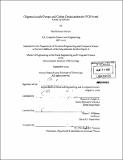Oligonucleotide design and codon optimization for PCR-based gene synthesis
Author(s)
Steiner, Paul Jamesen
DownloadFull printable version (4.084Mb)
Alternative title
Oligonucleotide design and codon optimization for polymerase chain reaction-based gene synthesis
Other Contributors
Massachusetts Institute of Technology. Dept. of Electrical Engineering and Computer Science.
Advisor
Thomas F. Knight Jr. and Brian C. Williams.
Terms of use
Metadata
Show full item recordAbstract
If synthetic biologists are to engineer novel biological functionality, they must be able to fabricate the DNA encoding it. A number of companies synthesize DNA for a fee, but their service is opaque. Researchers can alternatively perform their own syntheses, but the process is time-consuming and error-prone. This thesis introduces a software tool designed to make it simpler and more reliable. DNA is synthesized from overlapping oligonucleotides by ligation or PCR; this thesis focuses on PCR-based methods. Many sets of oligonucleotides can be used to synthesize a given sequence; choosing the optimal set is a computational problem. A number of software tools for oligonucleotide design exist, but none are adequate. Some employ poorly-designed algorithms, while others place unnecessary restrictions on oligonucleotide length or overlap size. An optimal set of oligonucleotides for PCR-based synthesis has no potential for mis priming and has maximally uniform overlap melting temperatures. We present an algorithm that finds such a set. Unlike similar algorithms, it places no restrictions on oligo length or overlap size except those given by the user. Mason, a tool employing this algorithm, has been implemented in Common Lisp. The space of potential sets of oligos is much larger when the DNA to be synthesized contains protein-coding regions; because the genetic code is degenerate, a combinatorial number of different sequences can encode the same protein. If the primary concern is a protein sequence, codons can be changed to synonymous codons with little consequence, making it possible to remove problematic repetitive elements. We show that our algorithm can theoretically be extended and used with constraint optimization algorithms to solve the more difficult problem of simultaneously optimizing codon usage and designing oligonucleotides for synthesis.
Description
Thesis (M. Eng.)--Massachusetts Institute of Technology, Dept. of Electrical Engineering and Computer Science, 2009. Cataloged from PDF version of thesis. Includes bibliographical references (p. 79-80).
Date issued
2009Department
Massachusetts Institute of Technology. Department of Electrical Engineering and Computer SciencePublisher
Massachusetts Institute of Technology
Keywords
Electrical Engineering and Computer Science.